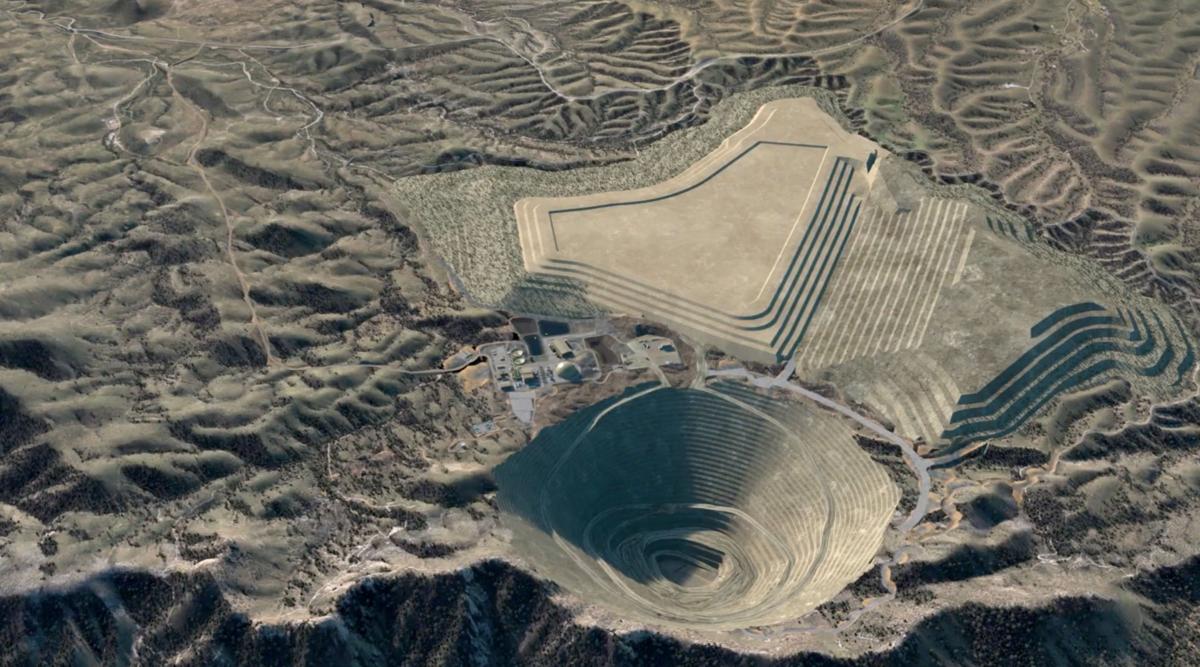The proposed Rosemont Mine has won a big victory on the regulatory front with a new agency decision that it no longer needs a federal Clean Water Act permit.
The U.S. Army Corps of Engineers decided Wednesday that the mine isn’t covered by the Clean Water Act because of recent Trump administration changes to federal rules that govern which streams and washes get regulatory control.
The decision still doesn’t mean the mine can be built. Other legal hurdles remain before construction of the $2 million project could begin in the Santa Rita Mountains southeast of Tucson.
The decision was made as Biden administration agencies are reviewing the Trump administration rules, which removed federal authority over many streams and washes nationwide.
It overturns previous preliminary determinations by the Corps, mostly in the early 2010s, that it had authority to regulate mine discharges under the Clean Water Act.
The Corps had asserted jurisdiction over the mine site itself, covering 8,676 acres on the east slope of the Santa Ritas. It also determined it had jurisdiction over the 757-acre utility corridor, which would go up the range’s west face to deliver water and power to the mine.
The agency had said a Clean Water Act permit was needed because the mining company would have to discharge dredge and fill material from 42 acres of washes, essentially covering some of them up, to build the open-pit copper mine.
But the federal rule changes, approved in June 2020, meant development along ephemeral washes that only run after storms, not year-round, is no longer regulated under the act.
The Corps decision said the streams that would be affected by Rosemont Mine construction are mostly ephemeral. Three areas where water courses carry water intermittently or perennially have no connection in normal years to rivers such as the Santa Cruz, which would require regulation, the decision said.
So now, no permit is needed.
Hudbay Minerals, which had previously asked the Corps to remove jurisdiction from the mine site, praised the new decision.
“We are pleased with the Corps’ decision that there are no Waters of the United States within the Rosemont project area, which is consistent with our own view. This determination is a positive step in advancing the Rosemont project,” Hudbay said.
Opponents were critical, particularly Stuart Gillespie, representing three tribes, the Tohono O’odham, Pascua Yaqui and Hopi, that have challenged federal approvals of the mine in court. Gillespie said this decision is “entirely inconsistent” with separate court actions by the Corps and the Environmental Protection Agency.
In a case now pending in U.S. District Court in Arizona, the two agencies are seeking to delay a lawsuit against the Trump administration’s rule to give the agencies time to review it. The lawsuit was filed by the Tohono O’Odham, Pascua Yaqui and four other tribes.
“The Corps should be ashamed of this decision to rush headlong forward, abdicate jurisdiction over the Rosemont Mine site, and give the mining industry a free pass to destroy some of Arizona’s richest streams and ecosystems,” Gillespie said.
A Clean Water Act permit was one of two crucial permits needed for the mine to start construction, the other being a favorable decision from the U.S. Forest Service. A federal judge in Tucson threw out the Forest Service’s approval in 2019. Hudbay and the federal government appealed, and the 9th Circuit Court of Appeals must decide whether to uphold that ruling.
If Hudbay wins that case, it must also secure federal sign-off on a new biological opinion covering Rosemont’s impacts on imperiled species. U.S. District Court also overturned approval of an earlier biological opinion, and Hudbay only appealed part of the ruling.
The Corps’ decision said the agency considered a wide range of information sources. They included federal climate data and wetland inventories, state groundwater data and surface water flow data, federal stream gauge data and data kept by Pima County and the Nature Conservancy.
Its staff also made a visit to the mine site in June 2019 and reviewed letters, reports and emails from several parties, the Corps said. They include Pima County Administrator Chuck Huckelberry, Hudbay consultants Westland Resources and Tetra Tech, the EPA and the U.S. Geological Survey.
Reacting to the ruling, Huckelberry said in a statement, “Unfortunately we are used to federal and state agencies abdicating responsibility when it comes to this proposed mine. This decision does not change our concerns about this mine and the impacts to public health and safety that are likely to occur, as has been the case for the majority of hard rock mines in recent decades.”
An attorney for another Rosemont opponent, the Center for Biological Diversity, Marc Fink, called the finding “appalling” and said the Biden administration should pause and review it.
“We’re confident it shouldn’t be allowed to stand because it violates the president’s (Biden’s) order that federal decisions must follow the best scientific information,” Fink said.
These changes behind Wednesday’s decision by the Corps were in the Trump administration’s Navigable Waters Protection Rule. It replaced the Obama administration’s Waters of the United States rule, approved in 2015, whose name refers to water bodies over which the federal government has authority.
Under a 2006 U.S. Supreme Court ruling, washes and other water bodies must have a significant connection to a navigable river to fall under Clean Water Act authority.





